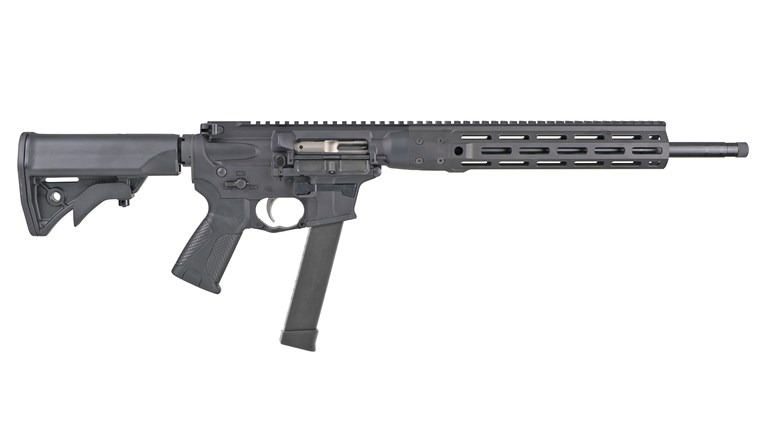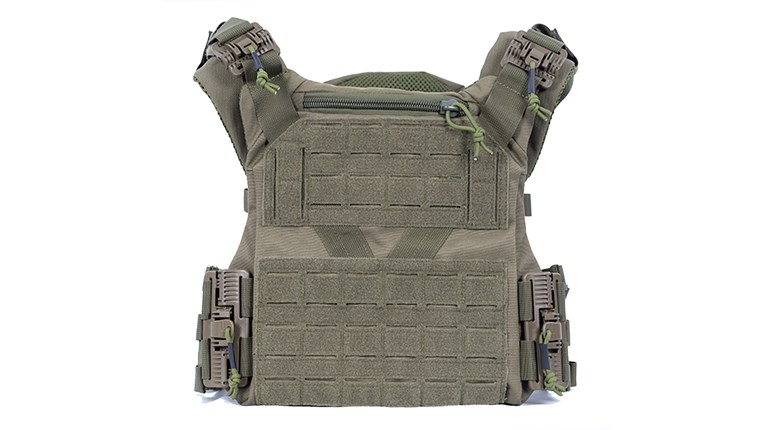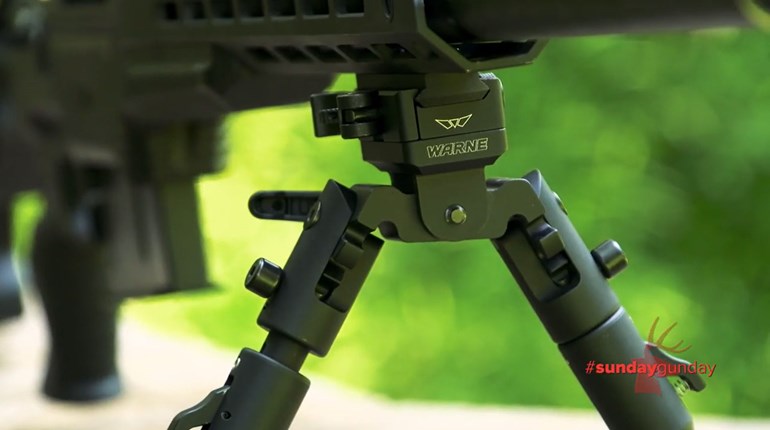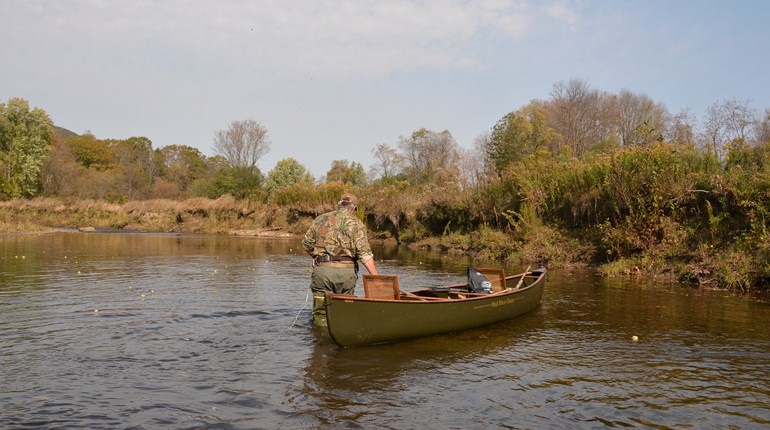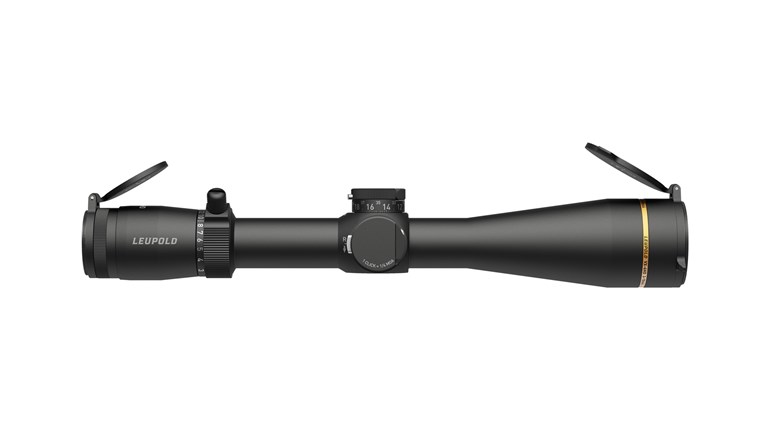
Over the years, I’ve developed an appreciation for the little .410 Bore, single-shot ‘utility guns.' Unfortunately, these shotguns are sometimes dismissed or overlooked by those who may not appreciate their niche design. A great up-to-date example of this class is the latest iteration of the Rossi Tuffy single-shot, called the SS Poly.
Chambered for either 3-inch or 2.5-inch .410 Bore shells, this shotgun is manufactured by Companhia Brasileira de Cartuchos (CBC), which is a Brazilian manufacturer based in Ribeirão Pires, São Paulo. The gun is available with either a brass bead 18.5-inch fixed Full choke barrel or an optics-ready 26-inch barrel for turkey hunting. The polymer stock color options include black, tan, OD green and gray. I chose to test drive the 18.5-inch barrel version with the gray stocks.

What sets this Tuffy apart from previous models is the black polymer receiver with molded-in steel supports at key stress points and an integral polymer trigger guard. While matte-black plastic lacks the heft and charm of the blued-steel receivers of yesteryear, it comes with the benefit of reducing the gun's weight significantly.

Traditional wood-and-steel single shots can weigh 5-pounds 8-ounces, or more, depending on the model. Previous Tuffy models with metallic receivers and polymer stocks weigh in at about 3 pounds 13 ounces. The SS Poly Tuffy is impressively light weight at just 2 pounds 14.5 ounces, unloaded, according to my handy dandy digital postal scale. At the end of a long day traipsing through the woods, the lighter polymer receiver will be appreciated for what it does if not for its looks.

In designing this Tuffy's receiver, the company provided needed updates to two other features, namely, the external safety and the barrel release. The older steel receiver models employed a somewhat awkward left side swing-lever safety with a barrel-release lever, located to the right of the hammer, that poked up and out from the receiver in a sore-thumb manner. The SS Poly receiver is fitted with a much more familiar and intuitive cross-bolt style, push-button safety. The steel barrel release lever has been replaced with a grooved polymer lever which fits flush to the receiver to eliminate snags and offers more refined appearance.

The two-piece smooth-bore barrel consists of a more robust 5-inch tapered chamber section fitted with a thinner and lighter 'pencil' barrel section with a fixed full choke. A spring-loaded ejector kicks out spent cartridge cases energetically send them sailing over the shooter’s shoulder.

The textured polymer fore-end and the thumbhole-style shoulder stock are fitted with sling-swivel studs. The fore-end's stud also serves as its support screw. Twisting out this forward stud allows the fore-end to be taken off and the barrel to be lifted out of the receiver. It's not the fastest way to break a shotgun in half but it does allow the Tuffy to be separated for more compact storage spaces if needed.

The Tuffy's exposed hammer is grooved for improved purchase and fitted with a transfer bar safety to prevent the gun from going off should the hammer be bumped or the gun dropped. Engaging the crossbolt safety prevents the hammer from being cocked but still allows the action to be opened for loading or unloading. This gun is a single-action, meaning, the hammer must be manually cocked for each shot fired. With the hammer cocked, the steel trigger exhibits no take up at all before breaking smoothly with 4-lbs. 6-oz. of trigger pull.

One of my favorite features of this Tuffy is the thoughtfully designed shoulder stock. It has a fairly short 11.5-inch length-of-pull (LOP) which is a good fit for smaller, more youthful shooters, and it makes the overall length of the gun just 31 inches. It can be a bit of a challenge to work with for larger shooters but it's still usable with a bit of practice.

Too often gunmakers waste the opportunity to make better use of their hollow polymer shoulder stocks by not providing either a storage compartment for emergency supplies or some other useful feature. Rossi wisely opted to provide cutouts to the left and right sides of the Tuffy's stock which are fitted with shell holders to accommodate up to eight rounds of .410-Bore shells in either 3-inch or 2.5-inch lengths.

The shell holders are angled forward which makes it easier to draw shells from them with the Tuffy shouldered. Should the shells be stowed in the stock with the primers up, towards the stock's cheek rest so that they are better shielded from unintentional impacts? Or, should the shells be placed primer down to facilitate quicker reloading in the field? That's up to you to decide, but it's nice to know that both options are available. The stock is capped with a ridge textured, soft-rubber recoil pad. It provides added purchase at the shoulder and takes the edge off the recoil when using more powerful loads.

The shorter-barrel .410s I've worked with tend to yield their most useful shot pattern results at distances of around seven to 15 yards. That's not all that far for sporting purposes. But this is not a sporting gun per se, it’s more of a get-it-done utility gun. Since this is the American Hunter website, I went ahead and conducted the pattern testing at 25-yards for those readers who would want to see results at a hunting or sporting clays distance.

Single rounds were fired into Birchwood Casey Dirty Bird 12x18-inch reactive silhouette targets. In this case, Winchester provided the four loads tested. The birdshot category was covered by two AA series 2.5-inch shells launching ½ ounces of lead birdshot at a listed velocity of 1,200-fps. One shell was filled with smaller #9 pellets and the other with larger #7 ½-sized shot. The #9 shot provided top to bottom target coverage that was a bit thin but likely to be effective for some small game and pests.

The #7 1/2 lead shot also covered the target. However, the pattern looks too dispersed at this distance to be effective. Of the two pellet sizes, the #9 looks to be the better fit for this gun.

It is a common practice to dismiss the .410 Bore as a defensive option. And I would agree that a single-shot gun in any caliber is less than optimal for personal protection. However, if the Tuffy is the gun at hand when the balloon goes up, there are effective defensive shells available which would be helpful to have on hand in a pinch. This is why I included two defensive rounds in the Tuffy's pattern testing. To learn more about how these shells performed during gel testing with another 18.5-inch barrel .410, follow this link.
Winchester's Super X .410-Bore buckshot loads are affordable, effective and tend to be more readily available than some options. They are available with 2.5-inch shells filled with three un-plated lead 00 buckshot pellets or 3-inch shells containing five pellets. In this case I took advantage of the Tuffy's 3-inch chamber to fire the five-pellet version. Recoil was more pronounced than with the birdshot loads but still in the .410 range. At 25-yards this round yielded a 10.5-inch group.
Counting the five pieces of lead shot and the wad, there is the potential for up to six holes in the target. However, in this instance, there are only four. There were no buckshot –sized holes around the target in the cardboard backing (only birdshot holes at that point). So my best guess is that the wad did not make it to the target and one of the five buckshot pellets followed another through the same hole in the target. It’s a bit of an odd pattern but I’ve seen other unusual patterns like this with .410 shells.

One of the most potent defensive .410 shells I've worked with is Winchester's 3-inch Defender PDX1 load which launches four pre-flattened, 40-caliber 65-gain disks followed by 16 pieces of BB shot for a total payload weight of 411-grains (I cut open a shell and weighed the shot with a digital powder scale). This cartridge has a listed velocity of 750 fps. but that's the .45 Colt/.410 handgun barrel speed. Fired from an 18.5-inch barrel the muzzle velocity moves up to around 1000 fps. So it should not come as a surprise that recoil with this load moves up into the 20-gauge range when fired from the lightweight Tuffy.
Unfortunately, the 3-inch PDX1 did not pattern well from this gun. Only one of the four disks hit the target, along with seven of the 16 pieces of BB shot. If you are looking for a defensive shell for use in close quarters or out in the field, a buckshot load is most likely the better fit for this particular platform.

The Rossi Tuffy SS Poly shotgun is appropriately named—it is tough, reliable and easy to operate single shot with a suggested retail price of $189. Real-world prices can be as much as $30 less. Is a shorter barrel .410 Bore like this one a do-all shotgun? Not really, but it was not intended to be. What it sacrifices in extended range and ammunition capacity it makes up for with its compact size, exceptionally lightweight and useful features. The Tuffy is an ideal trunk gun, backpacking shotgun or a handy little walking-around .410 that could be comfortably tucked into a bugout bag. It's also a hoot to shoot! For more information about this and other Tuffy models, visit rossiusa.com.

Specifications:
- Manufacturer: Companhia Brasileira de Cartuchos (CBC), Brazil
- Importer: Rossi USA
- Model: SS Poly Tuffy (SSP1-GRAY)
- Action: Break-Action, Single-Shot Shotgun
- Caliber: .410 Bore, 3-inch Chamber
- Barrel: 18.5-inch Carbon Steel, Smooth Bore, Matte Blued Finish
- Choke: Fixed Full (0.398")
- Receiver: Black Polymer with Molded-In Steel Supports
- Stock: Gray Textured Polymer
- Sight: Brass Bead
- Overall Length: 31 inches
- Height: 6.50 inches
- Width: 1.60 inches
- Length of Pull (LOP): 11.5 inches
- Trigger Pull: 4 pounces 6 ounces (As Tested)
- Weight: 2 pounds 14.5 ounces
- Capacity: 1 Round
- Accessories: Owner's Manual
- Suggested Retail: $189.99












